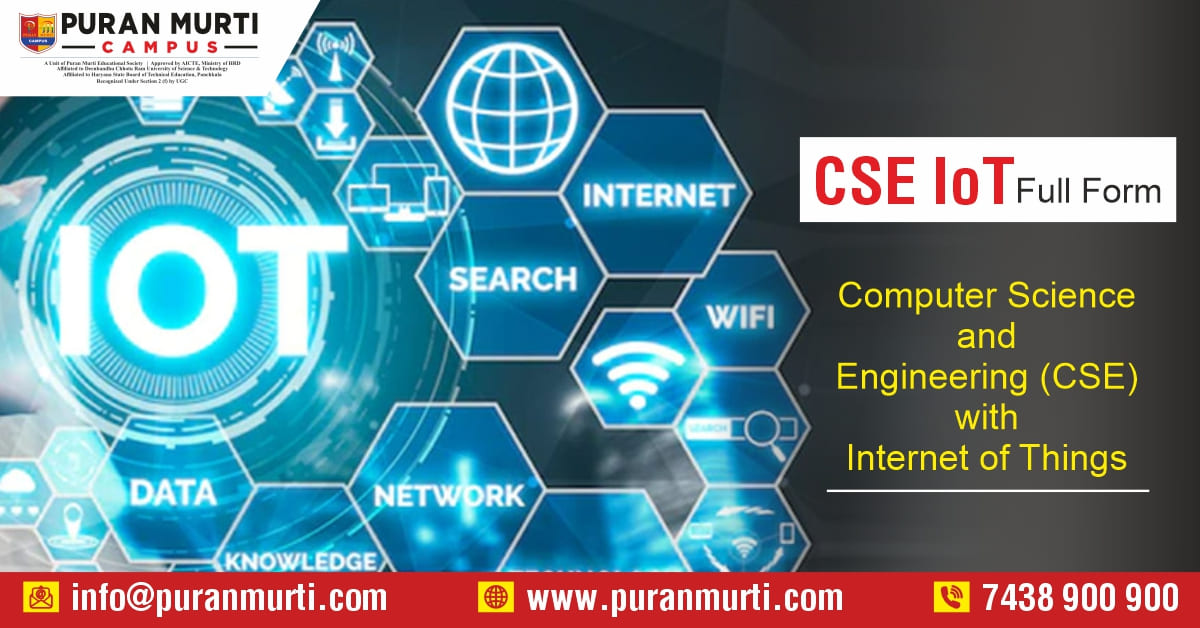
CSE IoT Full Form is Computer Science and Engineering – Internet of Things. This field integrates computer science principles with IoT technologies to develop smart and connected systems. As the world moves toward increased automation and connectivity, CSE IoT plays a crucial role in transforming industries and daily life. This interdisciplinary domain focuses on innovative solutions for real-time data processing, intelligent automation, and seamless communication between devices.
What is CSE?
Computer Science and Engineering (CSE) is a dynamic field that blends computer science with engineering principles. It covers everything from understanding computer operations to developing software, designing hardware, and solving complex problems with technology. This discipline includes programming, data processing, application and website development, as well as networking and database management. As technology advances, CSE continues to expand into areas like artificial intelligence, data science, and cybersecurity. Ultimately, it equips individuals with the skills to create and manage the technologies that power everyday life, from mobile applications to large-scale enterprise systems.
What is IoT?
The Internet of Things (IoT) refers to a network of interconnected devices that communicate and exchange data over the internet. These devices include everyday objects like smart home appliances, wearables, industrial sensors, and connected vehicles, all equipped with sensors and software to collect and process data.
IoT enables automation, remote monitoring, and real-time decision-making in various industries, including healthcare, agriculture, manufacturing, and smart cities. By leveraging technologies such as cloud computing, artificial intelligence, and big data analytics, IoT enhances efficiency, reduces costs, and improves convenience in daily life and business operations.
Key Aspects of CSE IoT
- Programming & Software Development – Writing code for IoT applications using languages like Python, C, and Java.
- Embedded Systems – Designing hardware and integrating microcontrollers like Arduino and Raspberry Pi.
- Networking & Communication – Understanding protocols such as MQTT, Bluetooth, and Wi-Fi for device connectivity.
- Cloud Computing & Big Data – Managing large-scale data storage and analytics for IoT applications.
- Cybersecurity – Ensuring data protection and secure communication in IoT networks.
- Artificial Intelligence & Machine Learning – Implementing AI models for automation and predictive analytics in IoT systems.
Applications of CSE IoT
- Smart Homes – Connected devices like smart lights, thermostats, and security systems.
- Industrial Automation – IoT-enabled factories for real-time monitoring and predictive maintenance.
- Smart Transportation – Vehicle tracking, automated traffic control, and self-driving cars.
- Agriculture – Precision farming using IoT sensors for soil moisture and weather monitoring.
- Healthcare – Wearable health monitors, remote patient tracking, and smart medical devices.
Career Opportunities in CSE IoT
| Career Opportunity | Skills Required | Industries |
|---|---|---|
| IoT Software Developer | Programming (C, Python, Java), IoT protocols | Smart Home, Healthcare, Industrial |
| IoT Systems Architect | Architecture, systems integration, IoT security | All IoT-related industries |
| Embedded Systems Engineer | Embedded programming, microcontrollers | Automotive, Healthcare, Agriculture |
| IoT Data Analyst | Data analytics, machine learning, Python | Smart Home, Healthcare |
| IoT Security Engineer | Cybersecurity, encryption, IoT protocols | All IoT-related industries |
| IoT Cloud Engineer | Cloud platforms, APIs, serverless computing | Healthcare, Smart Home |
| IoT Product Manager | Product management, project management | All IoT-related industries |
| IoT Solutions Architect | Solution design, cloud infrastructure | Healthcare, Automotive, Smart Home |
| IoT Firmware Engineer | Embedded systems, C/C++, real-time systems | Automotive, Healthcare, Agriculture |
| IoT Network Engineer | Networking, IoT protocols, network configuration | Automotive, Smart Home |
| IoT Consultant | Consulting, business strategy, IoT knowledge | All IoT-related industries |
| IoT Researcher/Academic | Research, machine learning, IoT innovations | Academia |
| IoT Maintenance Engineer | Diagnostics, network troubleshooting | Industrial, Smart Home |
Conclusion
The integration of IoT into Computer Science Engineering has created new opportunities that require professionals capable of developing smart systems using automation technologies. Due to increased application of automation, data intelligence, and AI, there is a growing need for specialists in CSE IoT fields. The design of sophisticated applications, the defense of IoT ecosystems, and the administration of cloud environments are only a few examples of career paths provided in the highly dynamic fields of medicine, smart housing, agriculture, and industrial automation. The ongoing technological changes make it obvious that the domains of CSE, IoT and technology along with digital transformation will continue to thrive.